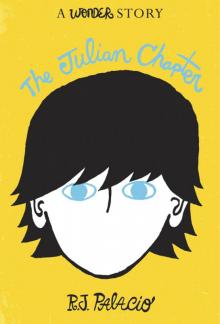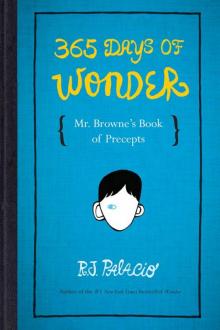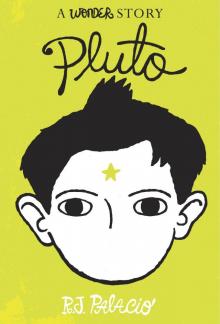- Home
- R. J. Palacio
365 Days of Wonder Page 3
365 Days of Wonder Read online
Page 3
Then I start talking about the obvious benefits of the precept. If everyone adopted that quote as his or her own personal precept, I ask them, wouldn’t the world be a better place? Imagine if nations adopted it as a mandate—wouldn’t there be fewer conflicts? Some kids agree, adding that if nations chose to be kind instead of right, it might even end world hunger. Other kids argue that being wealthy doesn’t have anything to do with being right.
I sometimes ask the students how hard it would be for them to choose to back down from an argument with their moms or dads or siblings if they knew they were right and the other person was wrong. Would they give in just to let the other person save face? Why? Why not? This part of the discussion is often very lively!
It’s not so simple a thing to choose to be kind. It’s one thing to back down from an argument with someone you love—a friend, say—because you don’t see the point in “winning” the argument at the cost of your friend’s feelings. But what if you believe in something that no one else believes in? What if you’re the only one who knows you’re right? Should you back down, just to be kind? What if you were Galileo and you knew you were right about the planets revolving around the sun, even though the rest of the world thought you were crazy—would you back down? What if you were living in the 1950s and you were against segregation—would you back down, just to be polite? What if you were standing up for something you believed in—would you really want to back down, just for the sake of kindness? No! You’d stand up and fight, right?
All this will often lead to some kids questioning whether the precept is really good, after all. At this point, I always suggest to them that maybe the most important words in the precept aren’t “kind” or “right.” Maybe the most important word in that whole sentence is the word “choose.” You have the choice. What do you choose?
As I said, my job is to plant the notion in your minds, kids. Inception. Once the seed is planted, all I try to do is keep shedding some light on it. And watch it grow. In time, you’ll begin shining your own lights, and then—watch out, world!
—Mr. Browne
OF BABOONS AND MEN
I read an article a few years ago about a couple of biologists who studied a troop of baboons over a twenty-year period. This particular troop was full of very aggressive “alpha” male baboons that routinely attacked and bullied the females and weaker males in the troop, depriving them of access to food sources. This proved unexpectedly advantageous one day when the alpha males ate infected meat. They all died, but the females and weaker males survived. Within a short time, the baboon troop took on a totally new dynamic. They were significantly less aggressive, more social, and, behaviorally, less “stressed” than before. What’s more, these changes lasted long after that first generation of “nicer” baboons died out. New baboons joining the troop assimilated the less aggressive behavior and passed it on. The transmission of “kindness”—if such it could be called—took root. And it grew.
So, why am I talking about baboons? No, I’m not about to compare a class of fifth graders to baboons, don’t worry! But I am going to go out on a limb (ha, no pun intended) and draw the following lesson: a small, dominant clique can set the tone for a group. Ask any teacher. If you’re lucky enough to have a few alpha kids in your class who can set a positive tone for the year, you’re in for a good year. Conversely, if you happen to get a few dominant kids who are bent on making trouble, then fasten your seat belts!
Last year turned out to be a great year. Although the usual fifth-grade antics were intensified by the Auggie and Julian “rift,” which ended well for Auggie, there was little drama among the girls. Summer, with her self-confident, sprightly nature, was a great influence. I had another student, Charlotte, who was also very sweet. We had this exchange via Google Docs the other day:
Hi, Mr. Browne. I’m writing an article for the school newspaper and was wondering if I could interview you about precepts. Hope you have the time.
Hi, Charlotte. I’d be happy to help.
Oh yay! Thank you! First of all, did you get my precept over the summer? “It’s not enough to be friendly. You have to be a friend.”
Yes, I did! Thank you for sending it. I liked it very much.
Thanks! You’re probably wondering why I chose that precept.
Yes, actually. I’m very curious.
Oh, well, here’s why. Do you remember at graduation, how Auggie won the Beecher Award? I thought that was so cool because he really deserved it. But I also kind of thought that other people should have won it, too. Like Jack. And Summer. They were such good friends to Auggie—even in the beginning, when kids were running away from him.
Hey, this part isn’t going to be in the newspaper, right?
Totally not!
Just checking! Sorry to interrupt.
No prob. It’s just that I started thinking about how I had never really gotten to know Auggie myself. Like, I was nice to him. I said hello in the hallways. I was never mean to him. But, you know, I never did what Summer did. I never sat down with him at lunchtime. I never defended him to my friends, like Jack did.
Don’t be too hard on yourself, Charlotte. You were always very nice.
Yeah, but “being nice” is not the same as “choosing kind.”
I see your point.
This year, I started sitting at the “summer” table. It’s me, Auggie, Summer, Jack, Maya, and Reid. I know some kids still don’t like being around Auggie, but that’s their problem, right?
Very right.
So anyway, back to the newspaper article. I was wondering if you could share with readers why you first started collecting precepts? What inspired you?
Hmm. I guess I first came upon the notion of collecting precepts when I was in college. I happened upon the writings of Sir Thomas Browne, a seventeenth-century man of all trades, and found his work deeply moving.
Seriously? His name was Thomas Browne?
Incredible coincidence, isn’t it?
So when did you start teaching precepts to kids?
Not too long afterward, when I started student teaching. Actually, it’s funny that you’re asking me these questions, because I’ve been thinking about putting together a book of all the precepts I’ve collected over the years, along with some essays in which I touch upon some of the very questions you’re asking me.
Really? That is such an awesome idea! I would totally buy that book!
Good! I’m glad you like it.
So I think those were the only questions I had. I’m looking forward to reading your book when it comes out.
Thank you. Bye, Charlotte!
What I loved most about this exchange was the idea that Charlotte herself realized the profound impact of kindness.
I began this essay with a true story of baboons, and ended with the story of a girl. In both, the transmission of kindness had taken root. What can biologists and teachers alike do but marvel at its impact?
—Mr. Browne
HEROES
One of my students dressed up as Frodo for Halloween last month, which caused me to casually make this offhand remark: “I love Frodo, but, let’s face it, Samwise Gamgee is the greatest hero of Middle-earth.”
Well, you would have thought I’d just said we were doing away with Halloween or something, judging from the number of gasps and “No way!”s I got. I don’t remember the last time one of my statements generated so much controversy in my classroom! Although the class was more or less evenly split between Aragorn and Frodo as the greatest hero—with some Gandalf advocates—not one person agreed with me about Samwise.
So I tried to elaborate on my crazy thinking. Sam, I reminded them, was the loyal companion to Frodo through thick and thin. All those times Frodo was about to give up, Sam kept him going. When Frodo couldn’t carry the ring anymore, Sam took Frodo on his back across the desolate plains of Mordor. When Sam thought Frodo was dead, he took the ring himself and set about to destroy it. And when the ring started working its seduction on h
im, Sam was one of the few creatures in all of Middle-earth who were able to resist the temptation. In a way, I told the kids, Sam stands as a shining example of the four virtues. In classical antiquity, it was believed that to be a truly great person, one should have in equal proportions the following four virtues:
WISDOM: prudence, as garnered from experience, or the ability to respond appropriately to any given situation.
JUSTICE: the ability to fight for what is right. The perpetual and constant will to render to each one his right.
COURAGE: the ability to confront fear, uncertainty, or intimidation.
TEMPERANCE: the ability to practice moderation—even when tempted to give in to one’s own self-interest or desire. Temperance is the art of self-control.
Samwise Gamgee is the epitome of all those virtues, I told my students. But then they pointed out that he wasn’t especially wise, which I had to give them. And he didn’t really live for Justice, which I had to give them, too. Ultimately, we decided, as a whole, that Sam stood for Temperance. He never gave in to his own wishful thinking, but stood fast and firm to help his friends.
“So what other fictional heroes can we think of that stand for the other virtues?” I asked the kids. And this is where the fun began! I gave them a couple of days to do some research, and then we had our class discussion.
For Wisdom, the most common name offered was: Yoda. “Come on!” I rebuked in a comical way. “Really? That’s such an obvious answer.” I told them I thought the wisest character, if we were going the Star Wars route, was Luke Skywalker. Not at first, of course. But after Luke learned to master his own feelings and gained a deeper insight into others’ feelings, he became a calm, cool, and collected Jedi Knight, who was smart enough to take on the dark side of the Force. They were not convinced. Apparently, Luke holds less appeal for the under-forty crowd than Yoda.
For Justice, we turned to The Chronicles of Narnia. Edmund, who actually becomes King Edmund the Just after redeeming himself, was the fairly unanimous choice.
For Courage, we went to the world of superheroes. A big debate arose about Superman versus Batman. Superman, it was pointed out, was very courageous, but then again, he was impervious to everything, except Kryptonite (and how many people carry Kryptonite in their pocket, right?). Batman, on the other hand, was just an ordinary guy with lots of gadgets, who was seriously brave. This remained an unresolved dispute, and just may be for the rest of time.
I actually used that great rivalry to bring up one of my all-time favorites: Achilles versus Hector. It was a fun way for me to introduce this ancient feud to those who hadn’t heard about it. Basically, I told them, Achilles was the greatest hero of the Greeks. His mother was a goddess, and when he was a baby, she dunked him in the river Styx and made him invincible—except for his heel, which was where she was holding him. What’s more, Achilles’s armor was forged by a god, making him even more impossible to defeat. And to top it all off, Achilles was the best-trained warrior of all time: the dude liked to fight! Hector, on the other hand, who was the champion of the Trojans, did not like to fight. Nor did he have a goddess for a mother or a god to forge his armor. In fact, he was just an ordinary guy who was especially good with a sword, fighting to save his home when one thousand Greek ships invaded his shores.
Then I told the kids about the epic fight between Achilles and Hector. They were so excited by it! Who says kids can’t be taught the classics anymore?
The final virtue to be debated was Temperance. What character from a book or movie best embodied the art of self-control? We turned to the world of Harry Potter for that one. Seems like Harry himself, though sometimes something of a rule-breaker, never abused his unique powers for self-gain. As one student said, he could have used his invisibility cloak a hundred times to do bad things, but he didn’t. Instead, he used his powers for the greater good. That’s the great lesson Rowling teaches.
It was quite a wonderful teaching day for me, one that sprang completely from a boy in a costume. Although I may have veered off-topic for a day, I think the lessons learned were more valuable than anything in today’s curriculum.
Teachers need the freedom to teach—freedom they can’t have if they’re only teaching so their students can pass tests. I’m pretty sure my students won’t find anything about Hector on the Common Core tests. I’m equally sure that what they learned about Wisdom, Justice, Courage, and Temperance may stay with them for the rest of their lives.
—Mr. Browne
MYSTERIES
December. The end of the year. The start of a new year. A chance to remember. A chance to look forward. It was nice hearing from some of my former students: Auggie. Summer. Charlotte. And, of course, the biggest surprise to me of all—Julian. That is, until I got this short and pithy email from Amos, one of my students from last year. This boy, who was generally a quiet kid, not one to speak up in class, surprised us all when he came to the rescue of Auggie and Jack at the nature retreat last year. He led the charge and showed great leadership. Sometimes kids don’t even know they’re leaders until they start to lead.
When I got this email, it was the answer to one little mystery (that I know I wasn’t the only person to wonder about).
To: [email protected]
Fr: [email protected]
Subject: My precept—at last!
Hey, Mr. B, hope you have a happy holiday! Sorry I didn’t get around to sending you a postcard over the summer. Had a lot going on, you know? But here goes: “Don’t try too hard to be cool. It always shows, and that’s uncool.”
What do you think? Cool, huh? I won’t explain what my precept means because it’s pretty obvious, right? I mean, you probably know who I’m talking about, right? Hee-hee-hee.
No, seriously. Last year was tough, man! Lots of drama! Yo, I’m not into drama, usually. That’s why I was so sick and tired of that stuff going on with Julian. There’s not a lot of drama this year, which is good. No one bothers Auggie anymore. I mean, a little, but not too much. Let’s face it, people are always going to stare a bit. But Auggie’s a tough little dude and no one messes with him anymore.
Okay, look, I’m going to let you in on a little secret. Ready? So, you know how Julian got in big trouble for leaving mean notes in Auggie’s locker, right? Everyone says it’s the real reason Julian’s not coming back to school next year. I’ve even heard a few people say he was actually suspended for it! Anyway, the big mystery is: how did Mr. Tushman even find out about the notes? Auggie didn’t tell him. Jack didn’t tell him. Summer didn’t tell him. Julian didn’t tell him. Miles didn’t tell him. And Henry didn’t tell him. You know how I know? Because … drumroll here … it was me! I’m the one who told Mr. Tushman about the notes. Didn’t see that coming, did you?
So let me explain a bit. What happened was that Henry and Miles knew Julian was leaving the mean notes. They told me about the notes but made me swear not to tell anyone. But after they told me, I thought it just really sucked big-time that Julian was being so mean to Auggie. It was kind of like bullying. And even though I swore to Henry and Miles that I wouldn’t say anything, I needed to tell Tushman about it so he could do something to protect Auggie. Hey, I’m an upstander—not a bystander! Little dudes like Auggie need guys like me to step it up, right?
So that’s the story, Mr. B. Don’t go telling anyone, though! I don’t want to be accused of being, you know, a “snitch.” Then again, I guess I don’t really care. I know I did the right thing.
Keep warm, Mr. B! It’s cold out there!
Yeah, maybe it’s cold out there, but this warmed my heart completely. I have to admit: I did not see that one coming. Just goes to show, everyone really does have a story to tell. And most people, at least in my experience, are a little more noble than they think they are.
—Mr. Browne
ACKNOWLEDGMENTS
So many people had a hand in making this book. I’d like to, first and foremost, acknowledge the amazing contribution of the children
who sent in their precepts—whether they ended up being included in this volume or not. There were over 1,200 submissions from people all over the world. The ones included in this volume are the ones I thought represented the spirit of Mr. Browne’s Precepts best. Precepts aren’t just maxims or pretty quotes, after all—they are words to live by, to elevate the soul, that celebrate the goodness in people.
I’d also like to thank my husband, Russell, and our two sons, Caleb and Joseph, for helping me go through all the submissions, one by one, and for their wisdom, insight, support, and love in all matters. I couldn’t do ANYTHING without you guys.
Thank you to Alyssa Eisner Henkin of Trident Media for being so incredible to work with on every level. Thank you to Erin Clarke, my WONDERful editor, Nancy Hinkel, Lauren Donovan, Judith Haut, Barbara Marcus, and the incredible team at Random House. A special thank-you to Janet Wygal, Diane João, and Artie Bennett for doing such an amazing job copyediting and helping me source so many of these quotes.
Thanks, as always, to the teachers and librarians who inspired me growing up, and who continue to inspire children every day. You are the real wonders of the world!
CONTRIBUTORS OF ORIGINAL PRECEPTS, ARTWORK, AND LETTERING
JANUARY 2: Roald Dahl quote contributed by Nate, age 10, Brooklyn, N.Y.
JANUARY 11: Paul Brandt quote contributed by Elia, age 13, Regina, Sask., Canada.
JANUARY 26: Oscar Wilde quote contributed by Faith, Greensboro, N.C.
JANUARY 31: Original precept by Dominic, Bennington, Vt.

 Wonder
Wonder The Julian Chapter
The Julian Chapter 365 Days of Wonder
365 Days of Wonder Pony
Pony Pluto
Pluto Shingaling
Shingaling